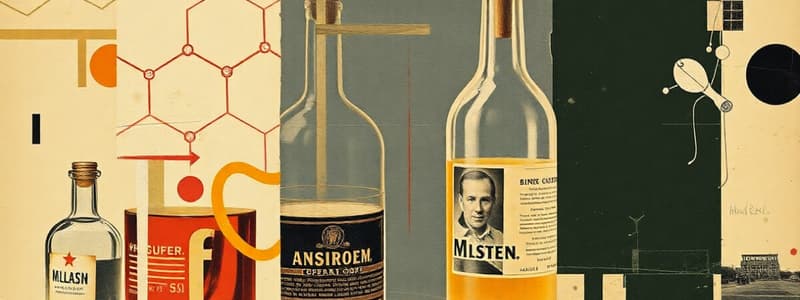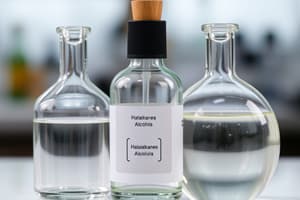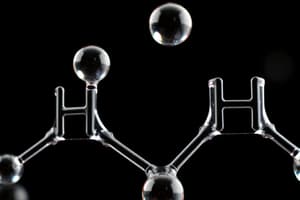Podcast
Questions and Answers
What product is formed when CH3CH2OH reacts with HBr?
What product is formed when CH3CH2OH reacts with HBr?
- CH3CH2Br (correct)
- CH3CH2I
- PI3
- H2O (correct)
What occurs during the dehydration of alcohols?
What occurs during the dehydration of alcohols?
- Removal of a water molecule (correct)
- Production of ketones
- Release of carbon dioxide
- Formation of halides
What is the product when primary alcohols are oxidized using acidified potassium dichromate(VI)?
What is the product when primary alcohols are oxidized using acidified potassium dichromate(VI)?
- Aldehyde (correct)
- Ketone
- Alcohol
- Carboxylic acid
What happens to potassium dichromate(VI) when it is used in the oxidation of alcohols?
What happens to potassium dichromate(VI) when it is used in the oxidation of alcohols?
Which of the following describes the bonds present in haloalkanes?
Which of the following describes the bonds present in haloalkanes?
What compound is produced when an aldehyde is oxidized under reflux conditions?
What compound is produced when an aldehyde is oxidized under reflux conditions?
During the oxidation of propan-2-ol with acidified potassium dichromate(VI), what is formed?
During the oxidation of propan-2-ol with acidified potassium dichromate(VI), what is formed?
What is the visible change observed when alcohols are oxidized with potassium dichromate(VI)?
What is the visible change observed when alcohols are oxidized with potassium dichromate(VI)?
What is the range of the fingerprint region in an IR spectrum?
What is the range of the fingerprint region in an IR spectrum?
Which of the following gases contributes to global warming through infrared radiation absorption?
Which of the following gases contributes to global warming through infrared radiation absorption?
What does mass spectrometry primarily identify?
What does mass spectrometry primarily identify?
What happens during the ionisation step of TOF mass spectrometry?
What happens during the ionisation step of TOF mass spectrometry?
In TOF mass spectrometry, what determines the radius of the path that ions take?
In TOF mass spectrometry, what determines the radius of the path that ions take?
How is the relative abundance of each isotope determined in mass spectrometry?
How is the relative abundance of each isotope determined in mass spectrometry?
What is displayed in the spectra print-out produced by mass spectrometry?
What is displayed in the spectra print-out produced by mass spectrometry?
Which bond types are relevant for the absorption of IR radiation by atmospheric gases?
Which bond types are relevant for the absorption of IR radiation by atmospheric gases?
What is a nucleophile defined as?
What is a nucleophile defined as?
Which of the following is a common nucleophile?
Which of the following is a common nucleophile?
What is the effect of increasing the Mr of the halogen in a haloalkane on the reaction rate?
What is the effect of increasing the Mr of the halogen in a haloalkane on the reaction rate?
For which types of haloalkanes can nucleophilic substitution reactions occur?
For which types of haloalkanes can nucleophilic substitution reactions occur?
What environmental issue is associated with CFCs?
What environmental issue is associated with CFCs?
What is the first step in the radical mechanism for the breakdown of ozone?
What is the first step in the radical mechanism for the breakdown of ozone?
In the radical mechanism for ozone breakdown, what happens in Propagation 1?
In the radical mechanism for ozone breakdown, what happens in Propagation 1?
What is the overall equation for the breakdown of ozone?
What is the overall equation for the breakdown of ozone?
What is the general formula for alcohols?
What is the general formula for alcohols?
Which type of alcohol has the hydroxyl group attached to a carbon bonded to two other carbons?
Which type of alcohol has the hydroxyl group attached to a carbon bonded to two other carbons?
What happens when alcohols combust with oxygen?
What happens when alcohols combust with oxygen?
What type of bond allows alcohols to be soluble in water?
What type of bond allows alcohols to be soluble in water?
What is replaced by a halogen when alcohols react with halogenating agents?
What is replaced by a halogen when alcohols react with halogenating agents?
What indicates the presence of alcohol when reacting with PCl5?
What indicates the presence of alcohol when reacting with PCl5?
Which of the following is true regarding the volatility of alcohols compared to alkanes?
Which of the following is true regarding the volatility of alcohols compared to alkanes?
In the context of alcohols, what does nucleophilic substitution involve?
In the context of alcohols, what does nucleophilic substitution involve?
What is the primary purpose of using reflux apparatus in organic synthesis?
What is the primary purpose of using reflux apparatus in organic synthesis?
How does distillation separate liquids?
How does distillation separate liquids?
What does the separating funnel primarily achieve?
What does the separating funnel primarily achieve?
What occurs during the redistillation process?
What occurs during the redistillation process?
What method is used to experimentally determine the boiling point of a compound?
What method is used to experimentally determine the boiling point of a compound?
What indicates the purity of a substance when comparing boiling points?
What indicates the purity of a substance when comparing boiling points?
What happens to vapors in a reflux apparatus?
What happens to vapors in a reflux apparatus?
In boiling point determination, what is measured during the condensation process?
In boiling point determination, what is measured during the condensation process?
What type of haloalkane has a halogen attached to a carbon that is at the end of the carbon chain?
What type of haloalkane has a halogen attached to a carbon that is at the end of the carbon chain?
Which halogen bond is considered the strongest in haloalkanes?
Which halogen bond is considered the strongest in haloalkanes?
In a nucleophilic substitution reaction of haloalkanes, what does the hydroxide ion act as?
In a nucleophilic substitution reaction of haloalkanes, what does the hydroxide ion act as?
What is the order of reactivity for haloalkanes from least to most reactive based on bond strength?
What is the order of reactivity for haloalkanes from least to most reactive based on bond strength?
What color precipitate is formed when silver nitrate reacts with chloride ions?
What color precipitate is formed when silver nitrate reacts with chloride ions?
When hydrolysis occurs with aqueous silver nitrate and ethanol, which product is formed along with halide ions?
When hydrolysis occurs with aqueous silver nitrate and ethanol, which product is formed along with halide ions?
What happens to the bond enthalpy of haloalkanes as the molecular weight (Mr) of the halogen increases?
What happens to the bond enthalpy of haloalkanes as the molecular weight (Mr) of the halogen increases?
Which reaction produces alkenes from haloalkanes?
Which reaction produces alkenes from haloalkanes?
Flashcards
Dehydration of Alcohols
Dehydration of Alcohols
A chemical reaction where a water molecule is removed from an alcohol molecule, resulting in the formation of an alkene. This reaction often involves heating the alcohol with concentrated phosphoric acid.
Tertiary Alcohols
Tertiary Alcohols
Alcohols that have the -OH group attached to a carbon atom bonded to three other carbon atoms. They are not easily oxidized.
Aldehydes
Aldehydes
The oxidation of primary alcohols with acidified potassium dichromate(VI) produces this.
Distillation
Distillation
Signup and view all the flashcards
Carboxylic Acids
Carboxylic Acids
Signup and view all the flashcards
Secondary Alcohols
Secondary Alcohols
Signup and view all the flashcards
Potassium Dichromate(VI)
Potassium Dichromate(VI)
Signup and view all the flashcards
Haloalkanes
Haloalkanes
Signup and view all the flashcards
Alcohol
Alcohol
Signup and view all the flashcards
Alcohol Nomenclature
Alcohol Nomenclature
Signup and view all the flashcards
Types of Alcohols
Types of Alcohols
Signup and view all the flashcards
Polarity of Alcohols
Polarity of Alcohols
Signup and view all the flashcards
Intermolecular Forces in Alcohols
Intermolecular Forces in Alcohols
Signup and view all the flashcards
Combustion of Alcohols
Combustion of Alcohols
Signup and view all the flashcards
Reaction of Alcohols with Halogenating Agents
Reaction of Alcohols with Halogenating Agents
Signup and view all the flashcards
Test for Alcohols
Test for Alcohols
Signup and view all the flashcards
Reflux
Reflux
Signup and view all the flashcards
Condenser
Condenser
Signup and view all the flashcards
Condenser (in distillation)
Condenser (in distillation)
Signup and view all the flashcards
Separating Funnel
Separating Funnel
Signup and view all the flashcards
Boiling Point Determination
Boiling Point Determination
Signup and view all the flashcards
Thiele Tube
Thiele Tube
Signup and view all the flashcards
What is a nucleophile?
What is a nucleophile?
Signup and view all the flashcards
What is nucleophilic substitution?
What is nucleophilic substitution?
Signup and view all the flashcards
How does a nucleophile attack in substitution?
How does a nucleophile attack in substitution?
Signup and view all the flashcards
Which haloalkanes undergo nucleophilic substitution?
Which haloalkanes undergo nucleophilic substitution?
Signup and view all the flashcards
How does halogen size affect substitution rate?
How does halogen size affect substitution rate?
Signup and view all the flashcards
What are chlorofluorocarbons (CFCs)?
What are chlorofluorocarbons (CFCs)?
Signup and view all the flashcards
How do CFCs affect the ozone layer?
How do CFCs affect the ozone layer?
Signup and view all the flashcards
What are the consequences of ozone depletion?
What are the consequences of ozone depletion?
Signup and view all the flashcards
Fingerprint Region
Fingerprint Region
Signup and view all the flashcards
Time of Flight (TOF) Mass Spectrometry
Time of Flight (TOF) Mass Spectrometry
Signup and view all the flashcards
Ionization
Ionization
Signup and view all the flashcards
Acceleration
Acceleration
Signup and view all the flashcards
Ion Drift
Ion Drift
Signup and view all the flashcards
Detection
Detection
Signup and view all the flashcards
Analysis
Analysis
Signup and view all the flashcards
Molecular Ion Peak
Molecular Ion Peak
Signup and view all the flashcards
Primary, Secondary, and Tertiary Haloalkanes
Primary, Secondary, and Tertiary Haloalkanes
Signup and view all the flashcards
Reactivity of Haloalkanes
Reactivity of Haloalkanes
Signup and view all the flashcards
Electronegativity and Bond Strength
Electronegativity and Bond Strength
Signup and view all the flashcards
Haloalkane Reaction with Aqueous Alkali
Haloalkane Reaction with Aqueous Alkali
Signup and view all the flashcards
Haloalkane Reaction with Ethanolic KOH
Haloalkane Reaction with Ethanolic KOH
Signup and view all the flashcards
Hydrolysis of Haloalkanes with Silver Nitrate
Hydrolysis of Haloalkanes with Silver Nitrate
Signup and view all the flashcards
Identifying Halide Ions with Silver Nitrate
Identifying Halide Ions with Silver Nitrate
Signup and view all the flashcards
Relative Stability of Haloalkanes
Relative Stability of Haloalkanes
Signup and view all the flashcards
Study Notes
Alcohols, Haloalkanes, and Analysis
-
Alcohols:
- Contain an -OH group.
- General formula: CnH2n+1OH.
- Can be primary (1°), secondary (2°), or tertiary (3°).
- Are polar molecules due to electronegativity difference between carbon and oxygen.
- Can hydrogen bond to water molecules, making them water-soluble.
- Less volatile than alkanes due to stronger intermolecular forces (hydrogen bonds).
- Can be produced via fermentation or hydration.
- Named according to IUPAC rules, adding the suffix -ol.
-
Reactions of Alcohols:
- Combustion: React with oxygen to produce carbon dioxide and water, releasing energy. Example: 2CH3OH + 3O2 → 2CO2 + 4H2O
-
Reactions with Halogenating Agents:
- Alcohols react with halogenating agents (e.g., PCl3, concentrated H2SO4 + KBr) to form haloalkanes.
- The -OH group is replaced by a halogen atom.
- Can be used as a test via reaction with PCl3 that produces white fumes.
- Reactions produce other products depending on which halogen-based compound is used.
-
Elimination Reactions:
- Alkenes are produced by dehydration of alcohols (removal of water).
- Heated with concentrated phosphoric acid.
-
Oxidation of Alcohols:
- Primary alcohols can be oxidised to aldehydes, then to carboxylic acids.
- Secondary alcohols can be oxidised to ketones.
- Tertiary alcohols are not easily oxidised.
- Oxidising agent: Acidified potassium dichromate(VI), visible colour change from orange to green occurs during the reaction.
Haloalkanes
-
Structure and Properties:
- Contain a halogen atom (F, Cl, Br, or I) bonded to a carbon atom.
- Polar molecules due to the electronegativity difference between carbon and the halogen.
- Reactivity varies based on the halogen (fluorine is most reactive, iodine is least).
- Reactivity decreases going down the halogen group, as bond strength decreases.
-
Substitution Reactions:
- React with aqueous alkali (e.g., NaOH) to form alcohols in a nucleophilic substitution reaction.
- Hydroxide ion acts as the nucleophile.
- React with ethanolic potassium hydroxide (KOH) to form alkenes via an elimination reaction.
- Hydrolysed with silver nitrate in ethanol to produce silver halide precipitates.
-
Nucleophilic Substitution Mechanism:
- Nucleophile attacks the carbon with a partial positive charge (δ+), and electrons are transferred to the halogen leaving group.
- Mechanism varies based on whether the haloalkane is primary (1°), secondary (2°), or tertiary (3°).
-
Relative Reactivity of haloalkanes: Reactivity increases with larger molar mass of halogen (I>Br>Cl>F)
Organic Synthesis
-
Synthetic Routes:
- Steps to produce a specific organic compound from a starting material.
- Consider reagents, reaction types, by-products, and safety.
- Efficient choice leads to lower costs and better sustainability.
-
Multi-Stage Synthesis:
- Involved multiple steps to produce a target molecule.
- Reactant→Intermediate→Product.
- Used for complex molecule synthesis.
-
Drying Agents:
- Used to remove water from organic compounds during purificiation.
- Example chemicals: magnesium sulfate, calcium chloride.
Analytical Techniques
-
Infrared Spectroscopy (IR):
- Used to identify functional groups by analysing infrared radiation absorbance.
- Different functional groups absorb IR radiation at characteristic frequencies and produce unique spectral curves (fingerprints).
- Indicates presence of specific bonds.
-
Mass Spectrometry:
- Identifies compounds based on their mass-to-charge ratio (m/z).
- Shows relative abundance of each isotope within the molecule.
- Can determine the overall molecular mass of the molecule, and identify fragmentation patterns for determining structure.
- Time of Flight (TOF) method: records the time ions take to reach a detector for generating a spectrum.
-
Combined Analytical Techniques: Used to help determine the structure of unknown organic compounds, e.g. Infrared spectroscopy & mass spectrometry.
Studying That Suits You
Use AI to generate personalized quizzes and flashcards to suit your learning preferences.




